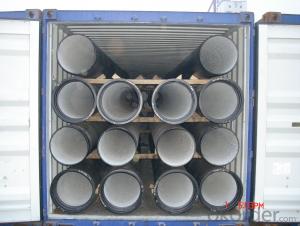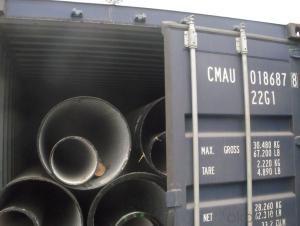DUCTILE IRON PIPES AND PIPE FITTINGS k9 CLASS DN1800
- Loading Port:
- Tianjin
- Payment Terms:
- TT OR LC
- Min Order Qty:
- 22 pc
- Supply Capability:
- 3000 pc/month
OKorder Service Pledge
OKorder Financial Service
You Might Also Like
Material : Ductile Cast Iron
Size Range : DN 80mm to DN 2000mm
Unit Effective Length : 6m or 5.7m
Manufacture Standard: ISO 2531:1998/ EN 545:2006/EN 598:2007
Annual capacity : 200,000 tons
Coating Exterior: Zinc 130g/m2 according to ISO 8179-1 and bitumen coating 70 microns.
Cement Interior: Portland Cement/ High Alumina Cement/ Sulphate Resisting Cement Lining according to ISO 4179
Special requirements on external coating and internal lining can be applied
We also provide accessories such as SBR/EPDM rubber gaskets, lubricant paste, pipe caps, PE sleeves, etc.
Additional Parts:
Each pipe is strictly inspected according to related standard to ensure permanently high performance.
Easy Installation at site and service free for life
Long Service Lifespan
Quotation will arrive you within 24hours once we get your inquiry.
We guarantee offering you a competitive price.
A copy of original inspection reports of pipes will be offered after shipment.
Photos of loading process will be sent to the customer after shipment effect.
We will follow-up the delivery progress after shipment effect and update to the customer on weekly basis.
- Q:What's the advantage of FCD50 ductile iron?
- Ductile cast iron pipes are called ductile iron pipes.
- Q:Are ductile iron pipes suitable for installation in areas with high soil compaction?
- Yes, ductile iron pipes are suitable for installation in areas with high soil compaction. Ductile iron pipes have high strength and durability, allowing them to withstand the pressure exerted by compacted soil. They can effectively resist external loads and provide long-term performance, making them a reliable choice for such areas.
- Q:Can ductile iron pipe be used for wastewater treatment plants?
- Ductile iron pipe is indeed applicable for wastewater treatment plants. This material is robust and long-lasting, displaying resistance against both corrosion and abrasion. Given the severe and corrosive conditions commonly present in such facilities, ductile iron pipe is frequently chosen. Its exceptional hydraulic performance further enables efficient and effective transportation of wastewater. Moreover, the simple installation and maintenance process of ductile iron pipe make it a practical preference for wastewater treatment plants. Ultimately, ductile iron pipe proves to be a dependable and economical alternative for wastewater treatment purposes.
- Q:DN300 how long is it for water polo and iron pipes?
- Blue interface cast iron pipe, blue fixed inner cushion rubber, blue gasket seal; rigid joint like cast iron pipe mouth, compared with straight pipe inserted cement sealing process, has been basically eliminated
- Q:Are ductile iron pipes suitable for use in geothermal applications?
- Yes, ductile iron pipes are suitable for use in geothermal applications. Geothermal systems involve harnessing the Earth's heat to generate energy or provide heating and cooling for buildings. Ductile iron pipes are known for their strength, durability, and corrosion resistance, all of which are vital qualities for geothermal applications. Geothermal systems often operate at high temperatures and pressures, and ductile iron pipes can withstand these conditions without compromising their structural integrity. They can handle the thermal expansion and contraction that occur in geothermal systems, ensuring a reliable and long-lasting piping solution. Furthermore, ductile iron pipes have excellent resistance to corrosion, making them well-suited for the potentially corrosive environment found in geothermal applications. This resistance ensures that the pipes will not degrade over time, maintaining the integrity of the system and minimizing the risk of leaks or failures. Additionally, ductile iron pipes have a smooth interior surface, which helps to minimize pressure loss and reduce energy consumption in geothermal systems. Their smoothness also reduces the likelihood of mineral deposits or scaling buildup, ensuring efficient and uninterrupted heat transfer. Overall, ductile iron pipes are a suitable choice for geothermal applications due to their strength, durability, corrosion resistance, thermal stability, and smooth interior surface. They provide a reliable and efficient piping solution that can withstand the demanding conditions of geothermal systems while ensuring long-term performance and minimal maintenance requirements.
- Q:How are ductile iron pipes protected against internal scaling or buildup?
- Ductile iron pipes are protected against internal scaling or buildup through the use of various coatings and linings. One commonly used method is cement mortar lining, where a layer of cement mortar is applied to the inner surface of the pipe to prevent scaling and corrosion. Additionally, epoxy coatings are also utilized, which provide a smooth and protective layer that inhibits the formation of scale and buildup. These protective measures help to ensure the longevity and efficiency of ductile iron pipes in various applications.
- Q:Can ductile iron pipes be used for stormwater management systems?
- Yes, ductile iron pipes can be used for stormwater management systems. Ductile iron pipes are known for their strength, durability, and corrosion resistance, making them suitable for handling stormwater runoff. They can effectively transport large volumes of water and withstand the pressure and impact associated with stormwater management.
- Q:How does ductile iron pipe handle soil movement?
- Ductile iron pipe is known for its excellent strength and durability, making it highly capable of handling soil movement. When the soil around the pipe shifts or settles, ductile iron pipes have the ability to flex and accommodate such movement without compromising their structural integrity. One of the key features that allows ductile iron pipes to handle soil movement is their inherent ability to withstand bending and stretching. They possess a high degree of flexibility, allowing them to adjust to ground shifts and settle without breaking or cracking. This flexibility is due to the unique material properties of ductile iron, which is a type of cast iron that has been treated with magnesium to enhance its strength and elasticity. Moreover, ductile iron pipes are designed with a thick-walled construction, which adds to their resistance against soil movement. This robust construction helps distribute the forces exerted by the shifting soil, minimizing the impact on the pipe and preventing any significant damage. In addition, ductile iron pipes are usually installed with appropriate bedding and backfill materials to provide additional support and stability. This includes using compacted soil or engineered granular materials around the pipe, which helps to evenly distribute the load and reduce the potential for soil movement. Overall, ductile iron pipe is an ideal choice for areas with high soil movement, such as regions with expansive or unstable soils. Its flexibility, strength, and proper installation techniques make it capable of handling the challenges posed by soil movement, ensuring long-lasting and reliable performance in various applications.
- Q:What is the maximum pressure rating for ductile iron pipe?
- The maximum pressure rating for ductile iron pipe typically ranges from 350 to 500 psi, depending on the diameter and wall thickness of the pipe. However, it is always recommended to consult the manufacturer's specifications for accurate and specific pressure ratings.
- Q:What are the common methods for flow control in ductile iron pipes?
- The common methods for flow control in ductile iron pipes include the use of valves, such as gate valves, butterfly valves, and check valves. These valves are designed to regulate the flow of water or other fluids in the pipe, allowing for control and adjustment of the flow rate. Additionally, flow control can also be achieved through the use of flow meters and flow regulators, which monitor and regulate the flow of fluids through the pipe system.
1. Manufacturer Overview |
|
|---|---|
| Location | |
| Year Established | |
| Annual Output Value | |
| Main Markets | |
| Company Certifications | |
2. Manufacturer Certificates |
|
|---|---|
| a) Certification Name | |
| Range | |
| Reference | |
| Validity Period | |
3. Manufacturer Capability |
|
|---|---|
| a)Trade Capacity | |
| Nearest Port | |
| Export Percentage | |
| No.of Employees in Trade Department | |
| Language Spoken: | |
| b)Factory Information | |
| Factory Size: | |
| No. of Production Lines | |
| Contract Manufacturing | |
| Product Price Range | |
Send your message to us
DUCTILE IRON PIPES AND PIPE FITTINGS k9 CLASS DN1800
- Loading Port:
- Tianjin
- Payment Terms:
- TT OR LC
- Min Order Qty:
- 22 pc
- Supply Capability:
- 3000 pc/month
OKorder Service Pledge
OKorder Financial Service
Similar products
New products
Hot products
Related keywords


























